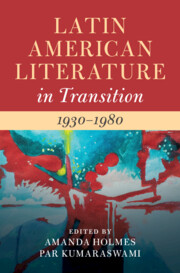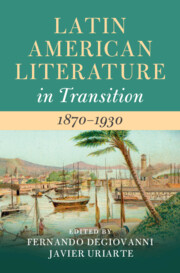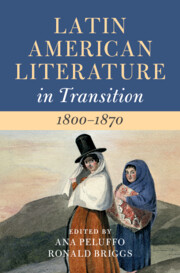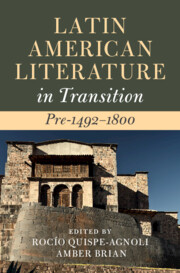Latin American Literature in Transition 1930–1980
Latin American Literature in Transition 1930-1980 explores the literary landscape of the mid-twentieth-century and the texts that were produced during that period. It takes four core areas of thematic and conceptual focus – solidarity, aesthetics and innovation, war, revolution and dictatorship, metropolis and ruins – and employs them to explore the complexity, heterogeneity and hybridity of form, genre, subject matter and discipline that characterised literature from the period. In doing so, it uncovers the points of transition, connection, contradiction, and tension that shaped the work of many canonical and non-canonical authors. It illuminates the conversations between genres, literary movements, disciplines and modes of representation that underpin writing form this period. Lastly, by focusing on canon and beyond, the volume visibilizes the aesthetics, poetics, politics, and social projects of writing, incorporating established writers, but also writers whose work is yet to be examined in all its complexity.
- Offers a complex understanding of how Latin American literature evolved in the mid-twentieth century, allowing readers to understand the connections and differences between and across a range of cultural and political contexts for literature in the continent
- Provides detailed examples of Latin American literary currents before and after the 'boom'
- Offers new readings of literature based on exploring non-canonical writers and texts, or understanding literary texts in other ways, allowing readers to think beyond the usual categories for literary analysis to uncover the concept of literature as a dynamic and complex phenomenon
Product details
November 2022Adobe eBook Reader
9781009188777
0 pages
This ISBN is for an eBook version which is distributed on our behalf by a third party.
Table of Contents
- I. War, Revolution, Dictatorship:
- 1. Revolutions and Literary Transitions: the 1960s Jorge Fornet
- 2. Jorge Luis Borges: Probing the Limits of World War Kate Jenckes
- 3. Antifascism and Literature in Brazil: The Many Wars of Antônio Callado Daniel Mandur Thomaz
- 4. Disaster Innovation in the Mid-Century Spanish-American Novel: Carpentier, Asturias, Donoso Stephen Henighan
- 5. Struggle at the Margins: The Intersections of Gender, Race, and Sexuality in Brazil's Literature of Revolution Rebecca Atencio
- II. Metropolis and Ruins:
- 6. Economic, Political and Ecological Disasters: The Metropolis and its Ruins in Latin American Poetry in the 1960s and 1970s Cecilia Enjuto Rangel
- 7. Mexican-Miracle Modernism Ignacio Sánchez Prado
- 8. Crime and the City: A Critical Walk through Latin American Crime Fiction and Urban Places Emilio J. Gallardo
- III. Solidarity:
- 9. 'Dar testimonio' as a Form of Solidarity and a Lens for Rethinking the Mexican Literary Canon Sarah Bowskill
- 10. Landscapes of Heterogeneity in a Mid-Twentieth Century Quechua Poem Charles Pigott
- 11. Beyond the Nation Frame: Rethinking the Presence of Indigenous Literatures in the Spanish-American Novel circa 1950 Estelle Tarica
- 12. Femininity in Flux: Gabriela Mistral's Madwomen Amanda Holmes
- 13. The Representation of Afro-Cuban Orality by Fernando Ortiz, Lydia Cabrera and Nicolás Guillén Miguel Arnedo Gómez
- IV. Aesthetics and Innovation:
- 14. Eros: After Surrealism and Before the Revolution (1945-1967) Sarah Ann Wells
- 15. Alejo Carpentier: Some Brief Bio-Bibliographical Notes Rafael Rodríguez Beltrán and The Return of the Galleons: Transitions in the Work of Alejo Carpentier Graziella Pogolotti
- 16. 'Un híbrido de halcón y jicotea.' Testimonio and its Challenge to the Latin American Literary Canon Par Kumaraswami
- 17. Literature and Revolution in Transition: An Aesthetics of Singularity Bruno Bosteels
- 18. Confluence and Divergence: Avant-garde Poetics in Twentieth-Century Spanish America and Brazil Odile Cisneros
- 19. Cortázar's Transitional Poetics: Experiments in Verse behind Experiments in Prose Marcy Schwarz.







